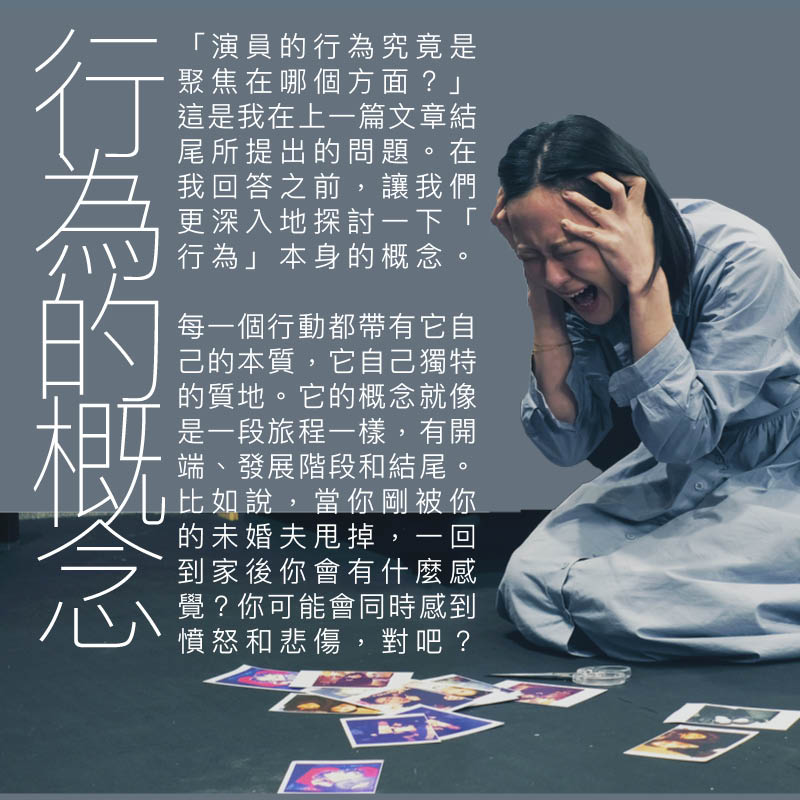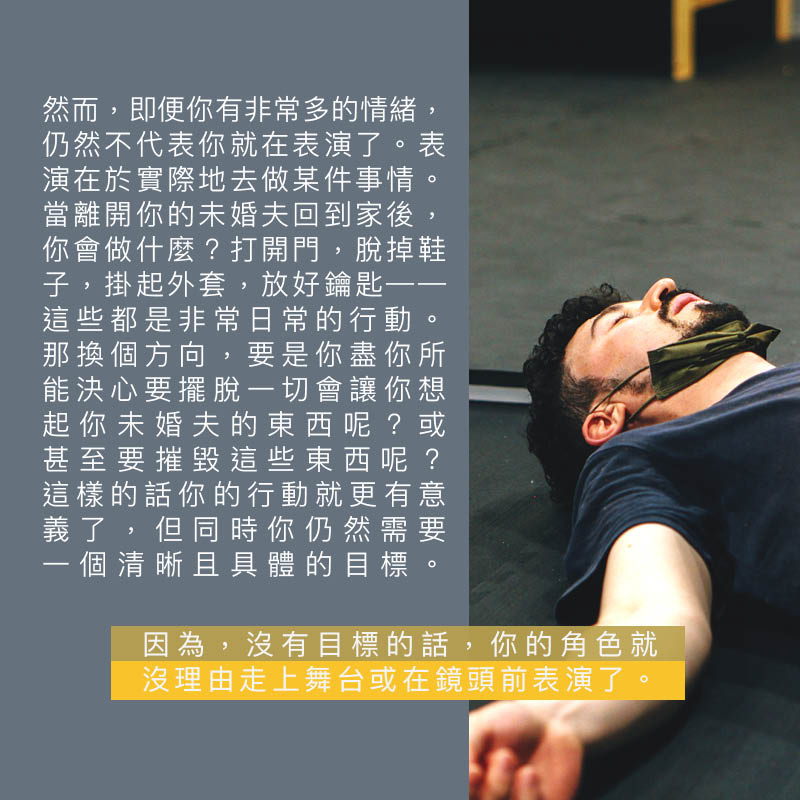「演員的行為究竟是聚焦在哪個方面?」這是我在上一篇文章結尾所提出的問題。在我回答之前,讓我們更深入地探討一下「行為」本身的概念。
每一個行動都帶有它自己的本質,它自己獨特的質地。它的概念就像是一段旅程一樣,有開端、發展階段和結尾。比如說,當你剛被你的未婚夫甩掉,一回到家後你會有什麼感覺?你可能會同時感到憤怒和悲傷,對吧?
然而,即便你有非常多的情緒,仍然不代表你就在表演了。表演在於實際地去做某件事情。
當離開你的未婚夫回到家後,你會做什麼?打開門,脫掉鞋子,掛起外套,放好鑰匙——這些都是非常日常的行動。
那換個方向,要是你盡你所能決心要擺脫一切會讓你想起你未婚夫的東西呢?或甚至要摧毀這些東西呢?
這樣的話你的行動就更有意義了,但同時你仍然需要一個清晰且具體的目標。因為,沒有目標的話,你的角色就沒有理由走上舞台或在鏡頭前表演了。
在這個例子當中,把所有的會讓你想起他的物品丟掉看起來可能滿像是一個目標的,但它仍然是一個薄弱的目標。但是當你把目標放到某人身上時——比如,把你的未婚夫給你的所有東西打包放進一個盒子裡,再附上一張充滿諷刺的便條——這樣的目標就變得更有意義、更迫切了,也因此變得更強烈。
作為一名演員,這就是你必須要做的。如果你與你的情境有很強烈的連結,光是行動本身就會帶給你許多情緒,甚至會比你預想的還更令人驚訝和出乎意料,無需勉強自己或把情緒當成一個目標。你的情緒會自然而然地出現。
作為一名演員在面對一場戲時,你可以自問:我能給自己什麼樣子的物理行動?什麼行動適合這個情境和我的角色?什麼能讓我活起來?什麼能讓我獲得我的目標?[這些都是你在每一堂Meisner課堂中工作的事情!]
正如之前所說,邁斯納教導表演的本質不僅僅是你表現的情緒,而是你行動的真實性。這種方法教你,演員,通過專注於行動來在你的表演中找到真實性——因為行動展示了你的角色的意圖和目標。
“Where is the doing of the actor located?” That’s the question I ended my last post with. Before I answer, let’s delve deeper into the concept of “doing” itself.
Every action carries its own nature, its unique quality. It’s akin to a journey you embark on, which has a beginning, development, and an end. For instance, what happens when you come home after your fiancé has left you? You’d likely feel a mix of sadness and anger, right?
Yet, being emotional is not the same as acting. Acting is about doing something. When you come home from your ex fiancé, what do you do? Open the door, take off your shoes, hang up your coat, put away your keys—these are all everyday actions. But what about getting rid of everything that reminds you of your ex? Maybe even destroying it? That could be more meaningful, but then you would still need a clear and specific objective. Because, without objective, there’s no reason for your character to enter stage or act in front of a camera.
In my example, disposing of reminders might seem like an objective, but it’s a weak one. It becomes more meaningful, more urgent, and thus stronger when directed towards someone else—say, packaging everything your ex gave you into a box to send back, accompanied by a sardonic note.
As an actor, you have to do just do that. If you’re well-connected with your scene’s circumstances, the sheer act of doing will bring emotions to you, more surprising and unexpected than you could have imagined, without the need to push yourself or even aiming to be emotional. Emotions will be there.
When working on a scene as an actor, ask yourself: What physical action can I give myself? What fits the situation and my character? What brings me to life? What supports my objective? [These are among the things you work on in every Meisner class!]
As said before, the essence of acting, as taught by Meisner is not just about the emotions you portray but about the truth of your actions. This approach teaches you, the actor, to find authenticity in your performances by focusing on the doing—because the actions show what your characters intention and objective is.







![作為一名演員在面對一場戲時,你可以自問:我能給自己什麼樣子的物理行動?什麼行動適合這個情境和我的角色?什麼能讓我活起來?什麼能讓我獲得我的目標?[這些都是你在每一堂Meisner課堂中工作的事情!]](https://prepod.meisner.tw/wp-content/uploads/2024/05/0420blog7.jpg)


